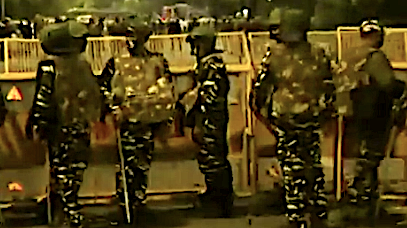
Sunday Snippets
 By Venkatesh Raghavan
By Venkatesh Raghavan
Geopolitical issues demand India to respect the sensitivities of both Israel and Iran
The low-intensity blasts outside the Israeli embassy in New Delhi, just prior to the weekend, served to be reminiscent of a terror attack way back in 2012 and has triggered a high-level probe with demands for protection and security pouring in from diplomatic quarters. It may be recalled that it was only after the late Prime Minister PV Narasimha Rao took charge of the country, running a minority government, did India agree to establish diplomatic ties with Israel. Traditionally, the Gandhi family was averse to make a move in this direction, fearing adverse reactions from the Arab states and also Palestinian freedom fighters, who were at that point of time headed by Yasser Arafat.
The terror angle that is getting probed by the local city police in addition to inquiries being made by National Security Guards (NSG) is currently in question about involvement of Iranian nationals. The theory about Iranian revolutionary guards seeking revenge for the killing of their country’s nuclear scientist, whom they term as a martyr, is doing its rounds not only in New Delhi and Tel Aviv, but also globally.
Also read: Sunday Snippets: The Teahouse had shut down long back
Going further back to 2008, the story of how Israeli nationals living in Trident hotel were targeted by militants during the 26/11 terror attack in Mumbai also lent itself to speculation from various quarters in the media besides capturing the attention of conspiracy theorists. Be it the national capital or the country’s financial capital, the attacks on Israeli citizens or embassy staff attracted a lot of attention from several quarters including the diplomatic channels between the two countries.
Tracing it back to the early nineties when India and Israel first established diplomatic ties and flowing into the recent decades that have witnessed attacks on their nationals living on Indian soil, there are several questions that merit a thorough scrutiny. It’s a known fact that Israel has from time to time been supplying India with state-of-the-art military technology. The latest in this series was the ability of the Indian army to remotely sense the presence of militants in any edifice and destroy the entire structure with the press of a button without having to sacrifice any lives that might result from an ambush situation.
Much to his credit, our current Prime Minister Narendra Modi has managed his tightrope walk safely, with repeated visits to Saudi Arabia and its Arab neighbours. Modi also managed to establish a stronger bond with Iran. At the same time, he also paid a visit to Israel and inspected their military technology with his Israeli counterpart. From the Indian point of view, Iran is an age-old ally dating back to the era of the Persian empire. Further, India enjoys a natural bond with the country that facilitates not only trading oil in rupees but also utilisation of Iran’s port facility to assist in India’s trade runtime.
However, from the American point of view, Iran is being projected as a terror exporting state and its ally Israel has a strong bone of contention with the Gulf state. While it would be a tricky thing to do for India to take sides on this front, India also has its plate full having to deal with a hostile neighbour like Pakistan. Ties with both Iran and the Arab states serve well in geopolitical isolation of Pakistan which is heavily dependent on Chinese support. However, India also needs good ties with Israel that can promote its military superiority in handling the proxy war that gets staged by neighbouring Pakistan at frequent intervals.
This implies, the Iran-Israel spat spilling on to a foreign soil, meaning Indian territory, is a major embarrassment for New Delhi. The situation needs to be dealt with utmost tact and the sensitivities of both nations, namely Israel and Iran have to be respected as India requires strategic support from these countries. At this point of time, India can walk the tightrope by stating the probe centres around non-state actors from Iran. However, as the plot thickens, it remains to be seen how the Iranian embassy reacts to their nationals being put under the scanner for alleged terror activities.





